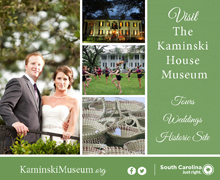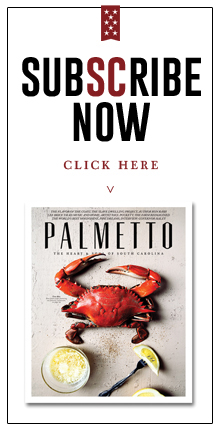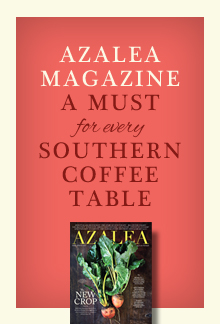
Music of the Forest
From deep in the pines of Bethera, South Carolina, the truest sound of American music rises from a rustic wood cabin.
From down the winding road and over the railroad tracks, a high lonesome sound dances through the Francis Marion National Forest. A keen ear might be able to follow the music to the weathered wooden shack hidden at the end of a dirt lane, but we rely on the directions I’d written down before we left home. It is fortuitous, because my phone displays the ‘no service’ warning several miles before we turn off Bethera Road onto the dirt track of Pickin’ Parlor Lane. With a foil-wrapped covered dish in hand, we make our way to the sign announcing our successful arrival at Guy and Tina’s Bluegrass Pickin’ Parlor.
Guy Faulk, a tall, lanky man with a shock of white hair, warmly welcomes us to the music hall he hosts here in the woods, as he has for countless guests every Saturday night for forty years. From a covered area to the left, a group of musicians stand in a circle, strumming and picking songs that I have not heard since childhood. “Come on in,” says Guy. “You can set your dish right inside on that long table, but sign the book first – and put your address. I like to know where folks come from.”
Walking into the doors of the Pickin’ Parlor is much like stepping into a time machine that shoots me straight back to a family reunion in the late 1970s; with the same kind of sweet smiles and greetings from ladies with cheeks flushed by the wood stove, a long table covered with fried chicken and biscuits, coconut pie, and a simmering crockpot of lima beans with ham. Nearby, a huge coffee urn stands, and there are stacks of paper plates, plastic forks, Styrofoam cups, and funeral-type fans advertising everything from the electric co-op to eternal rest. It is a déjà vu that warms my soul.
Snapshots of smiling faces stapled end to end tell a story of lifelong friendships, and an eclectic assortment of black and white photographs and paintings running the gamut from seascapes to charging stallions to fox hunting scenes hang alongside a black sombrero and an impressive array of antlers. From the rafters above the raised stage area, a dusty, circa 1962 bass swims languidly beside a terrifying stuffed black fox squirrel, with a huge set of steer horns that would have been at home on the front grille of a Cadillac with pointy fins.
Deeper into the room, an assortment of sofas, arranged in theater-style rows, draws us to soft seats, from which we will have a better vantage point to take in the surroundings. On the paneled back wall, Bill Monroe’s iconic white hat is a target that pulls the eye from his smiling poster toward the microphones, numbered 1 through 6, standing on the raised stage and awaiting the notes that will bring them to life.
Bluegrass is many things to many people, but as described by Elisabeth Burkett, editor of inTune, the string band style of music “combines elements of country/western, gospel, and blues music with the British, Irish, and Scottish music Appalachian mountain heritage.” For those new to the genre, think of music you’ve heard by The Avett Brothers, Alison Krauss and Union Station or Ricky Skaggs.
The fiddle, banjo, guitar, and mandolin are by far the most popular bluegrass instruments, along with the upright bass and dobro. Beyond the sofas, a group of six “pickers” gathers to get acquainted before their first set. Like a pick-up football game, each “band” is comprised of whoever shows up to play, and as is the case tonight, some have never played together before. Richard, on guitar, hasn’t been here in 18 years, and it is Dustin’s first time, but within minutes, they all pick and strum to the same rhythm.
No one feels like a stranger, and there isn’t an ounce of pretentiousness in the big room, as baseball caps and suspenders, flannel shirts soft with age, jeans that have earned their frayed pockets, and floral polyester sit comfortably beside khakis and golf shirts. Glancing around at the other patrons of the arts settling in for the night’s performance, I step across the shag-carpeted aisle toward a handsome, well-dressed gentleman to inquire how he found his way here. “Oh, I’m a regular,” says Mel Redford, a resident of North Charleston. “I came with some friends the first time, and I’ve been coming back every week for about 6 or 7 years. I just love this music.”
Before the music starts, I step back to the food table to see if anyone has cut the coconut pie. They haven’t, but when I replace the foil covering, my disappointment prompts a flurry of hands, all reaching to cut me a piece. I watch the seats fill and listen to the hum of friends catching up, and I’m struck by the fact that it feels a little like church. But when the musicians take the stage, instead of ‘Hallelujah,’ they call out requests, encouragement, and some good-natured heckling.
And then the music begins, and nothing exists but the pure sound of what is often called the truest form of American music. There are songs that make you ache with the longing in the singer’s voice, those that have you praying to the Lord for forgiveness, those that make you laugh right out loud, and of course, the ones that accuse lovers with “cheatin’ hearts.” Eyes grow damp when Guy Faulk’s son, Will, a gifted musician and the heir apparent to the rustic concert hall, dedicates a song to his mother, the original inspiration for the pickin’ parlor. Though she passed away several years ago, her essence lingers in the room.
“That’s Mr. Will Faulk on his mama’s guitar,” fiddle player David Brown points out to the applause of the crowd.
Over the course of two, hour-plus sets, the audience claps their hands and taps their toes to a delightful selection of tunes. In the second set, the bow of Brown’s fiddle draws notes from the antique instrument that alternately drenches the room with a sound like warm honey over biscuits, and makes you look around for an approaching train when the iconic tune of The Orange Blossom Special roars across the strings, while Jonathan Nabor’s and Linda Cockerill’s fingers fly across the strings of their mandolin and banjo to bring the train into the station.
You won’t stumble upon the Pickin’ Parlor by accident; it is purely a gathering of like-minded friends and only advertised via word-of-mouth. Chances are that if you find yourself here, you owe someone a thank you note of gratitude for pointing the way. There is no charge, but your covered dish is appreciated, and a dollar or two in the donation jar helps offset the cost of coffee and sodas.
With his dad, now in his eighties, slowing down a bit, Will Faulk has vowed to continue to honor the tradition his mother and father started so long ago.
“They started this right over there in a trailer,” he says. “My mom loved to play and sing, and there wasn’t any place to do that around here. It just kept growing, with people spilling out into the yard, until one day Dad decided to cut down the trees and build this place. I’ve promised him that as long as people keep coming and supporting it, I’ll do what I can to keep it going.”
As we bid goodnight to our new friends, I’m torn between telling everyone I know about this place, and selfishly keeping it a secret. But that would defy the spirit Guy and Tina intended when they founded Guy and Tina’s Pickin’ Parlor, and it is a gift too rich to be kept only on my plate, so I find myself already thinking of the friends I want to invite to hear the music we’ve discovered in the forest.
It’s obvious that bluegrass music virtually runs through the Faulk family’s veins, and as the night begins to wind down without him appearing on stage, I realize that I’ve forgotten to ask Guy Faulk if he plays. Looking down the dirt road which so many appreciative pickers and listeners have come to enjoy the gift of bluegrass music that he and Tina have offered through the years, he replies, “Sure I do!” And with a twinkle in his eye, he adds, “I play the Big Shot!”
Guy and Tina’s Pickin’ Parlor can be found at the end of Pickin’ Parlor Lane, in Bethera, SC. Shows are every Saturday night, 6-11 pm.
By Susan Frampton
Recommended
-
Q&A with Chris Jennings / Executive VP – Spartanburg CVBApril 17th, 2018
-
Music of the ForestApril 16th, 2018
-
Chairman of the BoardApril 16th, 2018
-
The Compass of a Community – Cooper’s Country StoreNovember 21st, 2017
-
History in the Making – Drayton HallNovember 21st, 2017








